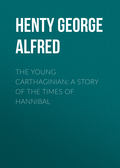
Henty George Alfred
With Wolfe in Canada: The Winning of a Continent
Quebec was now besieged by the French until, in May, an English fleet arrived, and destroyed the vessels which had brought down the stores and ammunition of Levis from Montreal. The French at once broke up their camp, and retreated hastily; but all hope was now gone, the loss of Quebec had cut them off from France.
Amherst invaded the country from the English colonies, and the French were driven back to Montreal, before which the united English forces, 17,000 strong, took up their position; and, on the 8th of September, 1760, Vaudreuil signed the capitulation, by which Canada and all its dependencies passed to the English crown. All the French officers, civil and military, and the French troops and sailors, were to be sent back to France, in English ships.
James Walsham was not present at the later operations round Quebec. He had been struck, in the side, by a shot by a lurking Indian, when a column had marched out from Quebec, a few days after its capture; and, for three or four weeks, he lay between life and death, on board ship. When convalescence set in, he found that he was already on blue water, all the serious cases being taken back by the fleet when, soon after the capture of Quebec, it sailed for England.
The voyage was a long one, and, by the time the fleet sailed with their convoy into Portsmouth harbour, James had recovered much of his strength. An hour after landing, he was in a post chaise on his way home. It seemed strange, indeed, to him, as he drove through the little town, on his way up to the Hall. He had left it, in the beginning of 1755, a raw young fellow of eighteen. He returned, in the last month of 1759, a man of twenty-three, with the rank of major, and no inconsiderable share of credit and honour.
He stopped the vehicle at the lodge gate, had his baggage taken out there, and proceeded on foot towards the Hall, for he was afraid that, if he drove straight up to the door, the sudden delight of seeing him would be too much for his mother.
John Petersham opened the door, and, recognizing him at once, was about to exclaim loudly, when James made a motion for him to be silent.
"Show me quietly into the squire's study, John," he said, grasping the butler's hand with a hearty squeeze, "and don't say anything about my being here, until he has seen my mother. They are all well, I hope?"
"All well, sir, and right glad they will be to see you; for Mrs. Walsham, and all of them, have been fretting sorely since the news came that you were badly wounded."
"I have had a narrow shave of it," James said; "but, thank God, I am as well now as ever!"
As he spoke, he opened the door of the study, and entered. The squire, who was reading the paper, looked up, and leapt to his feet with a cry of satisfaction.
"My dear boy, I am glad–thank God you are back again! What a relief your coming will be to us all!"
And he shook James warmly by both hands.
"I should hardly have known you, and yet you are not so much changed, either. Dear, dear, how delighted your mother will be! You have not seen her yet?"
"No, sir," James said. "I dismissed the post chaise at the gate, and walked up quietly. I was afraid, if I drove suddenly up, the shock might be too much for her."
"Quite right!" the squire said. "We must break it to her quietly. Wilks must do it–or no, he shall tell Aggie, and she shall tell your mother."
He rang the bell, and John, who had been expecting a summons, instantly appeared.
"Tell Mr. Wilks I want to speak to him, John."
The old soldier speedily appeared, and his delight was as great as if James had been his son. He went off to break the news, and, in a short time, Mrs. Walsham was in the arms of her son.
Major Walsham went no more to the wars, nor did he follow his original intention of entering the medical profession. Indeed, there was no occasion for him to do either. For Aggie insisted on his leaving the army; and she had a very strong voice in the matter. James had not long been home before he and the young lady came to an understanding. Before speaking to her, James had consulted his old friend.
"You know how I feel," he said; "but I don't know whether it would be right. You see, although I am major in the service, I have nothing but my pay. I owe everything to the squire, and he would naturally look very much higher for a husband for his granddaughter."
"Don't you be a fool, James Walsham," Mr. Wilks said. "I made up my mind that you should marry Aggie, ever since the day when you got her out of the sea. The squire has known, for years, what I thought on the subject. You will meet with no opposition from him, for he is almost as proud of you as I am. Besides, he thinks only of Aggie's happiness, and, unless I am greatly mistaken, that young lady has fully made up her mind on the subject."
This was indeed the case, for Aggie, when James had settled the point with her, made no hesitation in telling him that she had regarded him as her special property since she had been a child.
"I considered it all settled, years and years ago," she said demurely, "and I was quite aggrieved, I can tell you, when, on your arrival, you just held out your hand to me, instead of–well, instead of doing the same to me as to your mother."
"You shall have no reason for complaint, that way, in the future, Aggie, I promise you. But how could I tell? The last time I saw you, you were flirting, as hard as you could, with someone else."
"Well, sir, whose fault was that? You chose to make yourself disagreeable, and stay away, and what was I to do? I should do the same in the future, I can tell you, if you neglected me in the same way."
"I sha'n't give you the chance, Aggie. You can rely upon that."
The squire was fully prepared for the communication which James had to make to him, and, as there were no reasons for waiting, the ceremony took place very shortly afterwards.
The squire never asked any questions about his nephew. The official report had come home that Lieutenant Horton had died of drowning, while under arrest, but the squire forbore all inquiry, and, to the end of his life, remained in ignorance of the disgraceful circumstances.
Perhaps, in his heart, the news was a relief to him. He had never been fond of Richard as a lad, and his confidence, once shaken, had never been restored. He had intended to carry out his promise to leave him twenty thousand pounds; but he was well pleased that all that belonged to him should descend to his granddaughter. Mr. Wilks was the only resident at the Hall who ever learned, from James, the facts of Richard Horton's disgrace.
Years afterwards a few lines, without signature or address, came to James from America. The writer said that he was sure that he would be glad to hear that, under a changed name, he was doing very well.
"I shall never return to England," he ended, "nor ever forget your kindness and generosity."
The marriage of the young people made but few changes at the Hall. The squire proposed to give Aggie, at once, a sum which would have purchased an estate in the neighbourhood; but he was delighted to find that she, and James, had made up their minds that the party at the Hall should not be broken up.
"What do you want to send us away for, grandpapa?" she asked. "You three will be happier for having us with you, and James and I will be happier for having you with us. What nonsense to talk about buying another estate! We might get a little house up in London. It would make a change, for James and me to spend two or three months every year there, but of course this will be our home."
And so it was arranged, and so matters continued until, in the lapse of time, the seniors passed away, and James Walsham and his wife, and it may be said their children, became the sole occupants of the Hall, the estate having been largely increased, by the purchase of adjoining property, by the squire before his death. James Walsham might have represented his county in Parliament had he chosen, but he was far too happy in his country life, varied by a few months passed every year in town, to care about taking part in the turmoil of politics. He did much for Sidmouth, and especially for its fishermen, and, to the end of his life, retained a passionate love for the sea.







